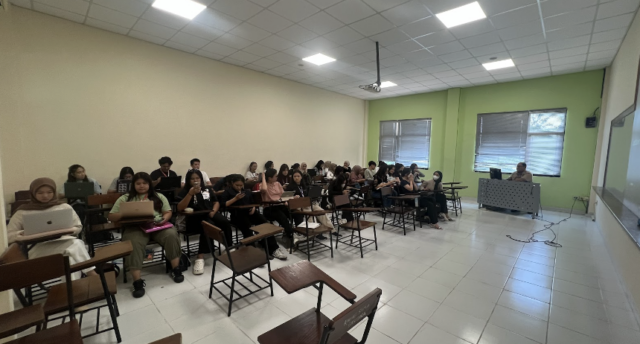A Day in LA64’s ‘The Origins of Psychology’ Class
The Origins of Psychology is a course in BINUS University’s psychology study program where students get to learn such things like the historical context behind perspectives in psychology and the paradigms that enrich discourse on humans. One of the lecturers who are in charge of teaching this course is Kak Yan Andre Peranginangin, M.Psi., Psikolog. And so, I was given the privilege to experience the course on the 7th October of 2024, in class LA64 during the fourth shift, specifically at 13:20-15:00, at BINUS’ Kijang campus in class C202 that was equipped with everything you could need in a comfortable learning environment–chairs with desks, functioning projectors and mics, AC, and a good lighting.
 Once class was due to start, the lecturer was already in the classroom minutes before 13:20. He starts by setting up the zoom meeting for students who are studying from home, and then the projector for presenting media to help with the teaching. When the lecturer was ready to begin class, he greets the students and asks whether they have any questions they want to give to him about the last session and their last assignment which was to make a mindmap. The lecturer’s method of communicating and teaching to students was rather relaxed and fun at times, making the students feel comfortable in going through with his class. The lecturer would slip in jokes at times in order to melt down the tension, and a lot of students had a few laughs throughout the session thanks to him. The lecturer continued with informing the students that on their second session after the next break, they’ll be doing a quiz to test their knowledge. Since this was a sudden quiz, the lecturer let them know that they have nothing to worry about as it is not graded and is simply to add points for their upcoming grades.
Once class was due to start, the lecturer was already in the classroom minutes before 13:20. He starts by setting up the zoom meeting for students who are studying from home, and then the projector for presenting media to help with the teaching. When the lecturer was ready to begin class, he greets the students and asks whether they have any questions they want to give to him about the last session and their last assignment which was to make a mindmap. The lecturer’s method of communicating and teaching to students was rather relaxed and fun at times, making the students feel comfortable in going through with his class. The lecturer would slip in jokes at times in order to melt down the tension, and a lot of students had a few laughs throughout the session thanks to him. The lecturer continued with informing the students that on their second session after the next break, they’ll be doing a quiz to test their knowledge. Since this was a sudden quiz, the lecturer let them know that they have nothing to worry about as it is not graded and is simply to add points for their upcoming grades.
During the class, the lecturer would also make sure that he engages with the students to implement an active learning type of method. Students are encouraged to give their opinions on the subject, but also without forcing them nor pressuring them. Thus, a lot of students felt safe enough to answer the lecturer’s questions voluntarily even if they might be wrong. They’re also encouraged to ask questions after every sub-topic so that he can ensure they understand all the materials he provides for them. It’s clear that the lecturer has admirably created a safe space in the classroom in the previous week’s sessions.
To make sessions less boring, the lecturer also offers and requests real life examples relating to their topic along the way. This gives both the lecturer and students a chance to share parts of their life or experiences whilst also learning. This also helps maintain students’ attention and interest in the class.
‘Behaviorism and Gestalt Psychology’ is the topic for the day’s session. Students are equipped with the knowledge on behaviorism–how humans come to form behaviors, and gestalt psychology in which is the idea of how the human mind and behavior are as a whole.
 A few things learned during the session is Thorndike’s contribution to behaviorism, where he focuses on the concept of connections between stimuli and responses (connectionism). Other than that is trial and error learning which is learning based on the repetition of response tendencies that lead to success. Finally, there’s law of effect which is how change of behavior depends on the situation. Next up, there’s Pavlov who’s famous for his dog conditioning experiment. In which one of his theories is what he calls conditioned reflex–reflexes that are conditional or dependent on the formation of association between the stimulus and response. Finally, there’s Watson who focuses on observable external reactions of individuals. He was also most known for his Little Albert experiment. Next off, the lecturer discusses neobehaviorism. In which the most prominent people of this study are Tolman, Hull, and Skinner. On this subtopic, Skinner is the most known name amongst the tree for his famous operant conditioning theory on reinforcement and punishment. As to end the session, the lecturer finishes by giving a jist explanation on sociobehaviorism and gestalt psychology.
A few things learned during the session is Thorndike’s contribution to behaviorism, where he focuses on the concept of connections between stimuli and responses (connectionism). Other than that is trial and error learning which is learning based on the repetition of response tendencies that lead to success. Finally, there’s law of effect which is how change of behavior depends on the situation. Next up, there’s Pavlov who’s famous for his dog conditioning experiment. In which one of his theories is what he calls conditioned reflex–reflexes that are conditional or dependent on the formation of association between the stimulus and response. Finally, there’s Watson who focuses on observable external reactions of individuals. He was also most known for his Little Albert experiment. Next off, the lecturer discusses neobehaviorism. In which the most prominent people of this study are Tolman, Hull, and Skinner. On this subtopic, Skinner is the most known name amongst the tree for his famous operant conditioning theory on reinforcement and punishment. As to end the session, the lecturer finishes by giving a jist explanation on sociobehaviorism and gestalt psychology.
Before students are permitted to leave the class, the lecturer checks the students’ attendances by calling them one by one before finally tasking the students by giving them a little assignment which is to identify implementations of reinforcement, punishment, observational learning, etc. that they apply to their everyday lives.


Comments :